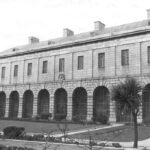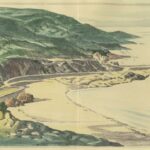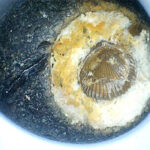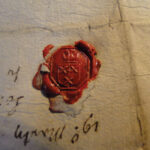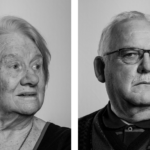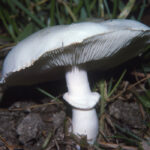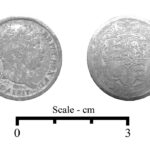Discovering the research of Millennium Fund Awardee Rory Hill
The Occupation of the Channel Islands is a painful memory in our history. But it is often the case that even in dark times, stories of hope and community often emerge. A great symbol of hope during this time came in the form of Red Cross parcels, delivering much needed supplies to the Islands. Of course, a major aid effort was coordinated by the British Red Cross, but there was also international aid delivered to Jersey and Guernsey during this time.
This is the focus of Société Jersiaise Millennium Fund Awardee Rory Hill, student at Oklahoma State University, who has been specifically researching the Canadian Red Cross parcels that arrived in the Channel Islands. This blog will quote from a recent report penned by Rory following his recent archival research trip to Canada partially funded by the Société’s Millennium Fund Grant to explore this historical partnership.

In preparation for his fieldwork, Rory assessed all of the Canadian archives for their relevance to his research and began to build his itinerary.
Explaining some of his difficulty in accessing information about the archives, Rory explained in his report: “It was necessary to contact all of these archives because in 2016, the Canadian Red Cross disbanded its central archive, and its rooms full of historical documents got dispersed to libraries and archives throughout the country. In some cases, these collections have not yet been catalogued, rendering access to them very difficult.”
But his vital dialogue with Canadian historian and author Sarah Glassford helped immensely with this as she had visited the central archive before it closed and used her findings to write her volume ‘Mobilizing Mercy: A History of the Canadian Red Cross’.
Speaking about the importance of working with other researchers and archivists, Rory said: “[Sarah] has been a great help in tracking down documents that are of relevance to this project, sometimes in unexpected places. I also received some documents in digital format, sent by kind archivists here and there.”
Rory visited the following Canadian archives in July of this year: Archives of Ontario (Toronto); Toronto Public Library (Toronto); Library and Archives Canada (Ottawa); Canadian War Museum (Ottawa); Bibliothèque Nationale de Québec (Montréal); and Archives of Manitoba (Winnipeg).

Rory explains that he made some interesting initial discoveries…
“The first thing is that I had, naively and vaguely, assumed that the food parcels had been sent expressly from Canada to the Channel Islands. Société historians will likely already know what I learned early on in the research, which is that the parcels were originally intended for Canadian and Allied POWs at camps in continental Europe. Tens of thousands of these were stockpiled in Lisbon, and some in transit in Marseilles and Geneva, in late 1944, when the desperate requests for aid came from the Bailiffs of Jersey and Guernsey.
“The decision was made between the British, International and Canadian Red Cross organisations to re-allocate a large portion of the parcels that were already in Lisbon for civilians in the Channel Islands, and these were the parcels that the SS Vega delivered over and again until May 1945. This is also why a small number of the parcels that landed in Jersey had been assembled in the USA, New Zealand or Australia; because some of those had made it to that central stockpile in Lisbon and got re-purposed for us, like the Canadian ones had.”
He also discovered a lot about the process of preparing the parcels in Canada, which he found out “was a massive undertaking within Canada”.
Putting the aid parcel effort into context, Rory explained that “It took place within a wider set of activities that the Canadian Red Cross undertook throughout the War, which included feeding and caring for returning servicemen and their families, fielding queries from around the world regarding displaced persons and POWs, gathering blood and serum donations for wounded soldiers, training and dispatching nurses to Europe, and providing advice to mothers on how best to feed their families at a time of rationing.”
He also found out that a lot of research and thought went into providing the most nutritional value within the parcels.
Rory’s report read: “a major concern with food and nutrition led the Canadian Red Cross to sponsor research into how to pack the most nutrition into the eleven-pound food parcels such as those received in Jersey.”
These parcels, Rory wrote, included “tinned prunes, powdered milk and tinned salmon”. The costs of these products were “carefully itemised, and extensive accounting records show how the money for these parcels was raised and spent. There was also a chocolatey surprise that led to an embodied experience for this researcher in Winnipeg, which will be recounted in the book!”

Describing how the parcels were prepared, Rory said that this “was almost entirely a volunteer effort which, at its peak in early 1945, was happening every day across warehouses in six cities across Canada, from Montreal in the east to Winnipeg in the west” and the packers themselves were mostly women.
Rory continued: “A news article from Winnipeg at the time celebrates the Fordist production line by which the goods were packed over and over again into the cardboard boxes, and in the photographs of that article we see some older men helping to move the finished boxes onto trucks, bound for ports and eventually Lisbon. Canadian Red Cross volunteers – through its many provincial and smaller divisions – also knitted clothing for Allied sailors and airmen, and for many civilian populations in Europe.”
Whilst the Channel Islands were not mentioned extensively in the archive material Rory encountered, he did find a letter from a Guernseyman thanking the Canadian Prime Minister for his country’s support in 1945. Rory also found that this gentleman received a reply and their exchange was printed in the Canadian press.
Rory’s report continues: “Another letter from Jersey, reproduced in the News Bulletin of the Ontario Division of the Canadian Red Cross, read: ‘These parcels definitely saved our lives, so let the Canadians know about this and tell them how grateful we are.’ And there was the full report of a visitor sent to the islands from Red Cross HQ in London very shortly after Liberation, which painted a vivid portrait of the islands at that time.”
Bringing his report to a close, Rory said that he has “remained in contact with several historians (including at the Société) throughout the year, and I intend to write something that will place the story of the food parcels coming to the Channel Islands within its wider context. That context includes a multinational Red Cross organisation, a changing Canadian society, a bountiful North American agriculture, the grim realities of war, and the numerous acts of solidarity that so thankfully emerged.”

Speaking about receiving the Millennium Fund Award he said: “I am very grateful for the support of the Millennium History Award, and I look forward to sharing this research more fully with Société members next year.”
The Société Jersiaise Millennium Fund for Research Fellowships and Grants is to promote high-quality academic or scholarly study of Jersey’s history and cultural heritage. The aim is also to encourage prospective MA and PhD students, and independent researchers also capable of producing substantive work outside the university system that meets scholarly standards for publishing and/or dissemination. The fund is not restricted to Jersey applicants, or those studying at British universities.
To find out more about the fund and apply yourself, click here. For those interested in discovering more about this period of history in Jersey, look out for the Société History Sections special lecture series in May next year to celebrate the 80th Anniversary of Liberation.

